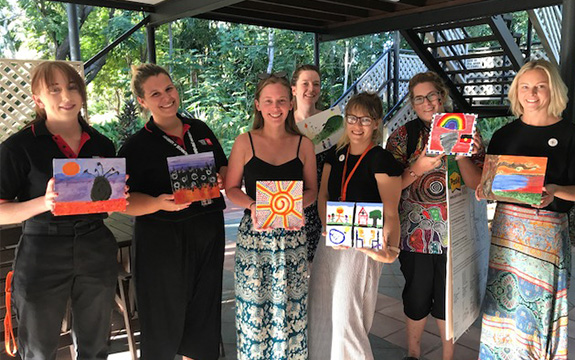Practicing occupational therapy in the Kimberley

In Summary
- Occupational Therapy student Grace Moore undertook a two-month placement at a school in Western Australia's Kimberely region
- Grace worked on building the emotion regulation skills, self-confidence and fine motor skills of children who displayed behavioural problems and developmental delay
- The experience exposed her to the challenges of remote and rural health care provision, as well as highlighting the importance of cultural awareness
Last year, Occupational Therapy (OT) student, Grace Moore, travelled to Western Australia’s Kimberley region, to work with children at St Mary’s College, a Kindergarten to Year 12 school in Broome.
Grace’s two-month placement was facilitated by the Majarlin Kimberley Centre for Remote Health, which aims to improve the health and wellbeing of Kimberley locals by engaging allied health and nursing students from universities across Australia.
Grace completed the placement alongside fellow Swinburne student, Stephanie Balis, and four others from the Australian Catholic University (ACU).
Together, the students focused on building the emotion regulation skills, self-confidence and fine motor skills - such as handwriting and using scissors - of children who displayed behavioural problems and developmental delay.
The experience exposed the students to the challenges of providing health care in a remote or rural area.
“In Broome, we had very limited resources - no standardised assessments to measure the children’s abilities and little equipment for treatment strategies,” says Grace.
“However, we learnt to adapt and overcame this by developing our own assessments, using our observation skills and implementing appropriate treatment plans.”
Understanding Indigenous culture
The experience also highlighted the importance of cultural awareness in remote and rural allied health practice.
The Yawuru people are the traditional owners of the lands and waters in and around Broome. Their culture is strong throughout the town and the St Mary’s College community.
On their first day, Yawuru woman Melissa Marshall from the Nulungu Research Institute at the University of Notre Dame Australia, provided the students with cultural safety training. This included an overview of the Yawuru people’s history and the impact of Broome’s pearling industry, as well as Yawuru traditions and the Indigenous kinship system, which determines how everyone relates to one another and their roles, responsibilities and obligations.
“The things I learnt on this day were invaluable,” says Grace.
“Not only did they greatly assist me throughout my placement, but they continue to in my everyday life,” she says.
Grace says this understanding of Yawuru culture allowed her and the other students to build meaningful relationships with the children, families and staff at St Mary’s College, and have the most impact with their work.
“The highlight of the placement was no doubt the people we worked with, and seeing the children respond to our treatment strategies,” says Grace.
“The children, families and staff at the school were so warm, caring and thankful for the help we provided.”
“The level at which they embraced us was an experience I don’t think we could’ve had in an urban setting.”
Closing the gap
After graduation, Grace plans to use the cultural awareness she developed on placement to further support Indigenous Australians, particularly in forensic and mental health settings.
“Previously, I assisted with a program at Jesuit Social Services that supports Aboriginal and Torres Strait Islander peoples to transition out of prison,” says Grace.
“Helping out there, as well as our exploration of Indigenous mental health in Swinburne’s Master of Occupational Therapy, exposed me to the overrepresentation of Indigenous Australians in the criminal justice system and the inequality faced by Indigenous Australians in mental health.”
“By working as an occupational therapist in forensic and mental health settings, I hope to help improve the lives of at-risk groups, including Indigenous Australians, and create a safer, healthier and more equal Australia.”

